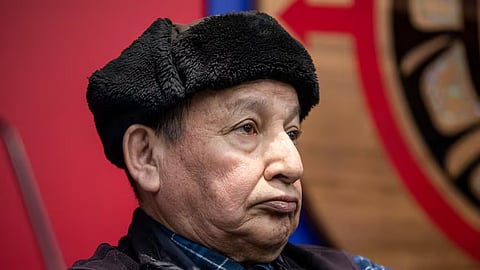

Don’t accuse the Grand Chief of BC First Nations of working both sides of the street when it comes to support for pipelines from Alberta — specifically the defunct Northern Gateway to Kitimat.
That’s because the president of the Union of B.C. Indian Chiefs, Grand Chief Stewart Phillip, says he never really supported increased market access for Canadian oil at all, despite making comments earlier this week that suggested otherwise.
Stewart on Wednesday issued an apology or comments made the day before, walking back remarks that appeared to support reviving the controversial Northern Gateway pipeline project.
The statement highlights the complexity — and some argue, the contradictions — of opposing pipeline expansion while grappling with international trade pressures and what amount to looming US trade sanctions.
Earlier in the week, Phillip had suggested Canada might have “no choice” but to reconsider projects like Northern Gateway in light of strained US-Canada relations and threats of tariffs under former U.S. President Donald Trump.
Speaking at a press conference, he described the situation as “staring into the abyss of uncertainty” and warned that failing to build pipeline infrastructure could allow the US to exploit Canadian resources with less environmental oversight.
“If we don’t build that kind of infrastructure, Trump will,” Phillip remarked Tuesday, suggesting the new Trump administration might pursue such projects without regard for environmental or legal standards.
If it was approved in 2016, Northern Gateway would have added about 500,000 barrels per day (bpd) of export capacity on top of the 880,000 bpd flowing through the Trans Mountain expansion for a total of nearly 1.4 million bpd or almost a third of Canada’s oil exports.
By Wednesday, however, Phillip backtracked, apologizing for what he called “confusion” over his stance. He is a member of the board of directors of the federal Green Party as well as affiliations with other West Coast environmental groups.
“I do not support resuscitating dead projects such as the failed Northern Gateway pipeline, which would have been an absolute disaster for our lands and waters,” Phillip said in a statement. He reaffirmed his opposition to large-scale resource projects that pose risks to Indigenous lands and ecosystems, emphasizing the Union of BC Indian Chiefs’ longstanding opposition to such developments.
Phillip also lauded the efforts of those who fought against the Northern Gateway pipeline, which was shelved in 2016 following widespread protests and legal challenges.
“It was an absolute honour and privilege to stand alongside thousands of others in opposition,” he said.
Critics, however, were quick to note the contradictions in Phillip’s messaging, calling attention to the broader challenge pipeline opponents face when balancing environmental concerns with economic and geopolitical realities.
The chief’s initial comments underscored the tension between resisting pipelines on principle while navigating a world where international markets and trade threats often dictate policy decisions. That neatly sums up Alberta Premier Danielle Smith’s contention that projects like Northern Gateway would have prevented the situation Canada finds itself in now.
“Smith had suggested that projects such as the Northern Gateway are needed to diversify Canada's export markets instead of being "so reliant on a single trading partner" such as the U.S.
"That's really the way that, through those kinds of major infrastructure projects, that we can start diversifying our customer base around the world," Smith said in an interview with CBC News from Washington, DC.
